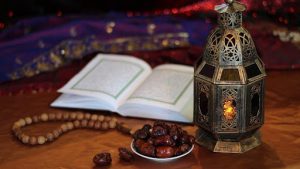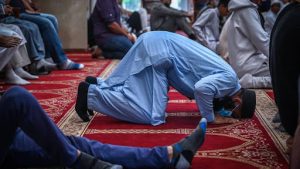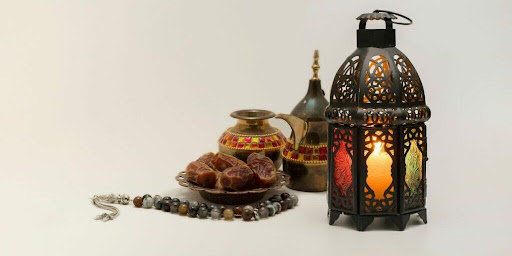Ramadan is one of the Islamic holy months, In which Muslims fast from before dawn to sunset. They neither eat nor drink anything but perform their daily duties as usual.
The purpose of Ramadan and fasting this month is to realize how their poor brothers and sisters feel when they don’t have any food to eat and are starving and to thank Allah for the blessings He has given them. In this article, we will discuss Ramadan meaning, and how Muslims celebrate this holy month.
Ramadan meaning in Islam

Art first let’s discuss Ramadan meaning in Islam Ramadan is the month of blessings The month of forgiveness. The month is full of mercy and God’s blessings in bounty.
It is the holiest month of the year for Muslims around the world and it reminds you to focus on your faith and work on personal growth. In Ramadan, we Skip eating and drinking during the day.
If you celebrate Ramadan fasting, you’re not supposed to eat or drink from sunrise to sunset. That includes water, any type of food or liquid, and things like gum.
Fasting is one of the five pillars of Islam. it isn’t just about not eating. It’s about learning to have sympathy with others, learning self-restraint, and giving to others in need. It is also time to focus on the most positive and important in the life of the believer.
Ramadan meaning in Islam is the time to strengthen the bond not only between Allah and his servant but also between the Muslim community:
- Ramadan allows Muslims to invite their friends and neighbors to Iftar.
- It means to make Muslims spend more time with their families during suhoor, Iftar, and going together to Mosque to perform a night special prayer known as Taraweeh.
- All Muslims reconnect with Allah through listening to the holy book, the Quran, doing more prayer, and giving Zakat.
- The end of Ramadan is marked by intense worship as Muslims seek to have their prayers answered during “Laylat al Qadr” or “the Night of Destiny.”
It is on this night, which falls during the last 10 nights of Ramadan, that Muslims believe that God sent the Angel Gabriel to the Prophet Muhammad and revealed the first verses of the Quran. - At the end of Ramadan, all Muslims gather together to celebrate the breaking of the fast through Eid al-Fitr. They celebrate this day by wearing nice clean clothes, visiting family and friends, and exchanging gifts.
True Ramadan meaning and importance for Muslims

Ramadan’s meaning derives from an Arabic root relating to scorching heat. For example, the word Ramad means “scorched ness”, and Ramda’ means “sun-baked ground”.
Ramadan can be spelled in diverse ways ( Ramazan, Ramadhan, Ramzan, Ramathan). Muslims can usually estimate the beginning of Ramadan by observing the crescent moon or Hilal which typically occurs one day after the new moon.
Once Ramadan begins, Muslims observe a month of fasting from sunrise to sunset. And they are only allowed to eat before sunrise or after sunset.
They also have to abstain from smoking, drinking, or having sex during the day of Ramadan. They have to devote more time to prayer, doing charity, and avoiding bad habits in this holy month. As when Ramadan arrives, Allah S.W.T opens the gates of Paradise and locks the gates of hell up, and the devils are chained.
The practice of fasting in Ramadan
Ramadan is one of the most important months in the Islamic calendar, during which Muslims perform fasting (Sawm), one of the key practices in the religion of Islam.
However, aside from being a month of fasting, Ramadan meaning for Muslims is deep with the opportunity to engage more in their routine religious activities and have a fuller experience of an Ideal Islamic life.
- Ramadan is a Gift from Allah
Ramadan is a door that has been opened to get Muslims nearer to Allah and to feel His presence more in their lives. This is the time when Allah forgives most and rains down His blessings more than any other time which can wipe away our sins and mistakes.
If we knew the real value of this month and were aware of all its rewards, we would wish every month to be Ramadan, as Prophet Muhammad (PBUH) believed.
We are so close to Allah in this month and so occupied with his divine remembrance that no time will be left for us to think or do what is not good for us, or what is against Allah’s command.
For that, the inward and outward evil stay far from us in this month of mercy, and it has been promised by Prophet Muhammad (PBUH) that in Ramadan, “the gates of hell are sealed and the gates of heaven are wide open and the devils are chained”.
2. Ramadan is the Month of Salvation and Forgiveness
Ramadan meaning also includes mercy, continues to bring forgiveness from Allah, and ends in granting our wishes and salvation from what has contaminated our souls. It is a time to think about our past mistakes and to make up for them, to make them right.
One of the prominent attributes of Allah is His excessive forgiveness and mercy which appears manifestly in a fuller sense in the month of Ramadan.
It is as if Allah has brought us tightly in His embrace and washed away whatever has separated us from Him, and we would be like a kid who has just been born like a soul finding its source. So, there is no better time to be forgiven than this holy month
3. Ramadan teaches us to control over urges
Ramadan teaches a person to have control over his urges, the urge to see non-mahram, the urge to commit obscenity, and the urge to show awrah to non-mahrams. Once you get control over your desires in Ramadan then you will develop Taqwa and your heart will not allow you to commit something which is prohibited in Islam.
Now that we have known Ramadan meaning, it is time now to get well prepared to welcome Ramadan and celebrate it with more worship and prayer, hoping to have Allah’s mercy and forgiveness.









